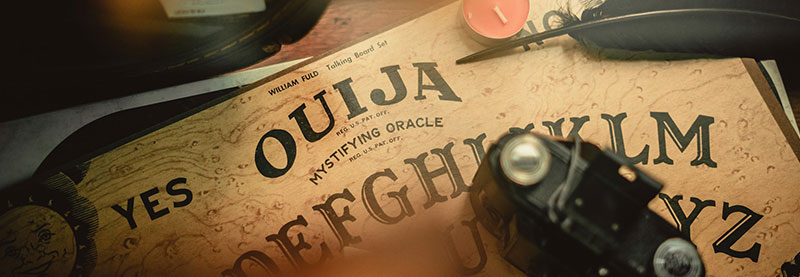Intellectual Property Insights from Fishman Stewart
Mini Article – Volume 24, Issue 17
Share on Social

A Copyright Ghost Story by Mark Twain
By Kristyn Webb
Halloween is coming up at the end of this month, and we are celebrating a little early with the spooky copyright story of Jap Herron!
It all began in the year 1917, when medium Emily Grant Hutchings and spiritualist Lola V. Hays supposedly contacted the spirit of Samuel Clemens—better known by his pen name Mark Twain—who died in 1910. Hutchings and Hays claimed that they made contact with the famed author from beyond the grave using a Ouija board, and that he dictated the Jap Herron manuscript to them in the same manner during séances.
New York publisher Mitchell Kennerly had the book printed and advertised it as penned by Twain’s ghost. This paranormal origin story sent shivers down the spine of Twain’s estate, sparking a legal battle over the spectral claims.
Twain’s estate, managed by Harper & Brothers, feared the book was a mere apparition of his legacy rather than an authentic creation and sued for copyright and trademark infringement. They argued that, if Twain had written the book, the copyright would flow to his estate, and that if he had not written the book, the unauthorized use of his name on the book was an attempt to capitalize on Twain’s fame and confuse consumers, and thus, was trademark infringement. This left Kennerly in a position of either standing by the assertion that a ghost had written the book and face the copyright infringement claim or admit that Twain’s spirit had no part in writing the book and face the trademark infringement claim.
In the end, the case was settled out of court, leaving unresolved the eerie question of whether a ghost can hold copyright rights. Kennerly agreed to stop selling Jap Herron and destroyed all remaining copies, but Hutchings never retracted her claims about making contact with Twain’s spirit.
This case remains a ghostly footnote in literary history, reminding us that even beyond the grave, the specter of copyright law looms large. Nowadays, it is rare to find a print copy of Jap Herron haunting bookshelves, but digital copies are available online for some spooky evening reading!
Kristyn Webb is the Group Leader of Fishman Stewart’s Copyright Practice Group, and holds a Master’s Degree in Copyright Law from King’s College London.


Published October 4th, 2024
Related Content from Fishman Stewart
By 1930, efforts began in New York to replace Mother's Day with Parent's Day because men were more than just breadwinners. Those efforts didn't catch on, probably because in that era, women often spent more time in the home.
In February, Nike and Skims announced that they will be working together on a new brand, NikeSkims. The co-brand will create a new line of training apparel, footwear, and accessories specifically designed to meet the unique needs of women athletes.
Generally, federal courts have exclusive jurisdiction over copyright cases, and often, this presents an insurmountable paywall for individual artists and small businesses to vindicate their rights, especially where the value of the individual copyrighted works are relatively low.
Dedicated to raising public awareness about the importance of encouraging innovation and creativity throughout the world, the World Intellectual Property Organization (WIPO) annually observes World Intellectual Property Day on April 26 to showcase the role that patents, trademarks, industrial designs, copyrights and trade secrets play in our everyday lives.
Hold onto your foam fingers, sports fans – college sports just got a whole lot more interesting! The latest updates to Name, Image, and Likeness (NIL) rules are making student-athletes bigger than ever, and it’s not just about the game anymore.
Did a federal court in Louisiana recently decide that US copyrights are global rights? It seems so.
One of his most famous songs, “Lose Yourself” was recently at the center of a lawsuit. In 2019, Eminem’s publishing company Eight Mile Style sued Spotify claiming that Spotify streamed a number of its musical compositions without proper licenses.
One of the most common challenges is whether AI should be free to train on data that is protected by copyright and owned by third parties without first obtaining permission.
The U.S. Copyright Office (USCO) recently published its latest report on AI and “copyrightability.” In short, the USCO considers only some AI-generated works to be sufficiently creative as to deserve copyright protection, and thus, registration.
Back in the 1940’s assignments by independent contractors could be permanent and irrevocable. Things changed in 1976, when Congress overhauled the Copyright Act.
IDENTIFYING, SECURING AND ADVANCING CREATIVITY®













